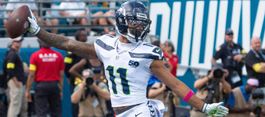“Zero RB” is a strategy that has long-polarized the fantasy football community.
My guess is, the first time you were ever introduced to fantasy football, you were confused as to why running backs are generally the most coveted players. Quarterbacks are the most important player on the field, so why is the first round of my fantasy draft mostly RBs?
Well, soon you learned (or didn’t, if you’re my uncle and perennially drafted Tom Brady in the first round no matter who told him he’d be available five rounds later) that RBs have generally had the most opportunities to score fantasy points based on standard-ish scoring formats and roster structures.
Is that still true, though? In a sense, no. We’re seeing committee running back approaches take over the league, often leaving good running backs on the bench when their team is in the red zone. Passing offenses have become more efficient, leading to certain receivers’ workloads becoming more bankable than their running back counterparts.
That leads us to Zero RB.
Did Zero RB Work in 2022?
The Zero-RB strategy in standard (12-team, PPR, etc.) leagues is generally defined as not taking a running back with one of your first three picks AND taking no more than one in your first five or six picks.
So – did it work in 2022?
If you drafted Justin Jefferson, Travis Kelce and Patrick Mahomes early and snagged Rhamondre Stevenson in round seven, yeah, I’d say it worked out.
If you snagged Cooper Kupp, Kyle Pitts and Lamar Jackson early and spent your mid-round fliers on Antonio Gibson, Rashaad Penny and Chase Edmonds, then no, your season likely went up in flames.
Of the top twelve running backs drafted last season, according to historical Average Draft Position data, only five of them returned that value: Austin Ekeler, Christian McCaffrey, Derrick Henry, Dalvin Cook and Nick Chubb.
So, when should I employ a zero RB strategy?
I’d recommend it if your draft doesn’t deal you a running back bargain. If Ekeler falls to pick seven – please pull the trigger. If Saquon Barkley falls to the middle of the second round, of course take him. However, outside of an extremely small list, I wouldn’t recommend reaching for a running back.
Our small list should be talented, automatic 20+ touches per game guys. This year, for me, that’s McCaffrey, Jonathan Taylor and Ekeler. I don’t blame you if you disagree, either.
That’s why zero RB strategies are so attractive. We could debate for days about what Taylor’s role in the Colts’ offense looks like with a new quarterback and head coach. Tyreek Hill, on the other hand, I don’t think any of us are questioning his role in Miami.
Now, more than ever, we shouldn’t be scared of drafting receivers or TEs like Kelce and Mark Andrews early. 20 years ago, the NFL’s average completion percentage was 59.6%. 10 years ago it was 60.9%. Five years ago it was 62.1%. Last season it was 64.2%.
Passing attempts per game aren’t necessarily up, but passer ratings and passing yards per game are, in general, increasing, and interceptions are decreasing. Offenses are completing more passes and sustaining drives longer, making receivers more valuable in fantasy football. If we can land a player who’s likely to lead a good offense in receptions, I’m likely taking them over a running back who isn’t one of the three I just mentioned.
Another wrinkle of a zero RB strategy is taking a quarterback or tight end early. The best way to win a zero RB draft is by taking Kelce or Andrews with a reasonable selection and coupling them with a few studly wide receivers. Kelce and Andrews are as close to sure things as we get, and landing one of them gives us a massive positional advantage over 8-10 of our opponents who have to decide between Tyler Higbee and Cole Kmet every week.
Zero RB strategies are most effective in leagues smaller than 12 teams. This is mainly because of the positional advantage Kelce, Andrews, and a great QB give you. In an eight or 10 team league, there are enough solid WR’s and RB’s to go around. That’s not necessarily the case with TE’s and QB’s.
RBs to consider targeting after round five
Javonte Williams (DEN): ECR – RB 27
Williams has been hampered by injuries, but there’s no denying he’s looked great when on the field. Assuming he’s fully healthy to start the season, his competition for lead RB is Samaje Perine. Give me all the Williams stock.
AJ Dillon (GB): ECR – RB 34
With Aaron Jones, Dillon is, at worst, a 50/50 split guy in a run-heavy offense. If Jones were to miss a game for any reason, Dillon becomes an RB1.
Elijah Mitchell (SF): ECR – RB 41
Just because McCaffrey had a great season doesn’t mean he’ll avoid injuries forever. One knick to McCaffrey and Mitchell, as the 49ers RB1, becomes a fantasy asset.
Chase Brown (CIN): ECR – RB 79
Here’s your super-duper budget option. Brown was drafted in the fifth round and his competition behind Joe Mixon is Trayveon Williams and Chris Evans. If Mixon misses any time, I’m banking on Brown to get the first crack at earning the lead role.
At Illinois, Brown was a home run threat with some tantalizing potential. I was a fan of his in the draft process and love where he is right now for fantasy purposes, assuming Cincinnati doesn’t add another body to the RB room.
Subscribe: Apple Podcasts | Spotify | Google Podcasts | Stitcher | SoundCloud | iHeartRadio











